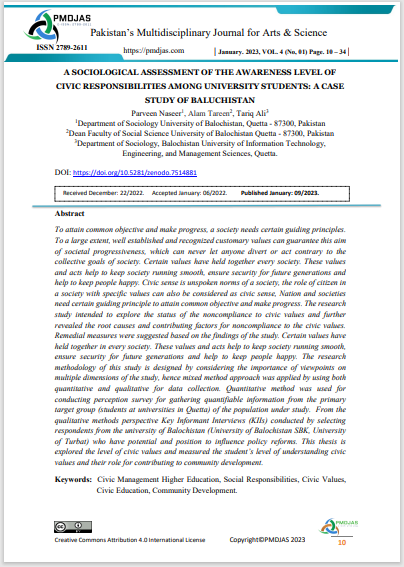A Sociological Assessment of The Awareness Level of Civic Responsibilities Among University Students: A Case Study of Baluchistan
DOI:
https://doi.org/10.5281/zenodo.7514881Keywords:
Civic Management, Higher Education, Social Responsibilities, Civic Values, Civic Education, Community DevelopmentAbstract
To attain common objective and make progress, a society needs certain guiding principles. To a large extent, well established and recognized customary values can guarantee this aim of societal progressiveness, which can never let anyone divert or act contrary to the collective goals of society. Certain values have held together every society. These values and acts help to keep society running smooth, ensure security for future generations and help to keep people happy. Civic sense is unspoken norms of a society, the role of citizen in a society with specific values can also be considered as civic sense, Nation and societies need certain guiding principle to attain common objective and make progress. The research study intended to explore the status of the noncompliance to civic values and further revealed the root causes and contributing factors for noncompliance to the civic values. Remedial measures were suggested based on the findings of the study. Certain values have held together in every society. These values and acts help to keep society running smooth, ensure security for future generations and help to keep people happy. The research methodology of this study is designed by considering the importance of viewpoints on multiple dimensions of the study, hence mixed method approach was applied by using both quantitative and qualitative for data collection. Quantitative method was used for conducting perception survey for gathering quantifiable information from the primary target group (students at universities in Quetta) of the population under study. From the qualitative methods perspective Key Informant Interviews (KIIs) conducted by selecting respondents from the university of Balochistan (University of Balochistan SBK, University of Turbat) who have potential and position to influence policy reforms. This thesis is explored the level of civic values and measured the student’s level of understanding civic values and their role for contributing to community development.
Downloads
References
Alexander, R. (1999). Compang Classrooms and Schools. In R. Alexander, P Broadfoot, Bangwar, D. A. (2019, 12 2). The Plight of Civic Values. Daily Times.
Adrianaaldana, B. (2013). Four Forms of Youth Civic Engagement For Diverse Democracy. Children And Youth Services Review, 2-14
Bhatia, N. (2015). Towards A Better Tomorrow: Civic Sense and Its Importance In Society. The Progressive Teacher Magizine.
Branson, M. S. (1998). The Role of Civic Education. Center For Civic Eduction.
Brudney, F. H. (2020). Cultural Values and Volunteering: A Cross-Cultural. J Acad Ethics (2011) 9:87–106, 6-20.
Burgess, P. L. (2011). Understanding How Institutional Leadership Affects Civic Engagement on University Campuses. West Texas A & M University, 3-30.
Cox, C. J. (2005). Education for Citizenship and Democracy In The Americas: An Agenda for Action. Washington DC: Inter-American Development Bank.
Cross-Cultural, C. V. (2020). Femida Handy & Jeffrey L. Brudney. J Acad Ethics (2011) 9:87–106, 6-20.
D, E. (1954). Developing Civic Values Through Social Studies. The Journal of Education , 8-10.
Danielle N. Lussier, M. S. (2012). Restricted Access Indonesia: The Benefits of Civic Engagement. Journal of Democracy Johns Hopkins University Press Volume 23, Number 1, January 2012, 5-22.
Dr. P.P. Shajimon, G. (2018). Relationship Between Civic Sense And Performance of 10th Standard Students In Social Science. IOSR Journal of Research & Method In Education (IOSR-JRME) , 2-5.
Gerbner, G. (1972). The Structure and Process of Television Programme Content Regulationin The U.S. G.A. Comstock & E. Rubinstein (Eds) , 386-414.
IDEA. (2006). Democracy, Conflict And Human Security Policy Summary: Key Findings And Recommendations. IDEA.
Jafri, A. (2018, 06 5). Civic Sense: Towards A Better Tomorrow. Retrieved 10 20, 2020, From Data Stories: Http://www.Datastories.Pk/Civic-Sense-Towards-A-Better-Tomorrow.
Jamieson, K. H. (2013). The Challenges Facing Civic Education. Daedalus; Journal of The American Academy of Arts & Sciences , 65-83.
Jasmine B.Y. Sim, S. C. (2017). Riding The Citizenship Wagon”: Citizenship Conceptions of Social Studies Teachers In Singapore. Teaching and Teacher Education , 92- 102.
Keen, C. (2009). New Efforts To Assess Civic Outcomes. Journal of College And Character. , 1-6.
Khan, T. A. (2017, 7 10). Lack of CIVIC SENSE: Nature, Causes and Remedies. Danish . Kraut, R. P. (1998). Internet Paradox: A Social Technology That Reduces Social Involvement and Psychological Well-Being? . The American Psychologist.
Lott, J. &. (2011). Assessing The Psychometric Properties of Civic Values. Journal of Mahoney, L. (2016). Social Media And Civic Engagement. In L. M. Tang, Strategic Social.
Mihailidis. (2014). The Civic-Social Media Disconnect: Exploring Perceptions of Social Communication & Society , 1059-1071.
Rathore, C. P. (2016). Relationship Between Civic Sense and Civic Responsibility of Rossi, G. (2016). Factors Associated With Civic Engagement In Civic School, Family, and Peer Contexts. Journal of Community Psychology, 44(8) , 3-8.






